
- Home
- India
- World
- Premium
- THE FEDERAL SPECIAL
- Analysis
- States
- Perspective
- Videos
- Sports
- Education
- Entertainment
- Elections
- Features
- Health
- Business
- Series
- In memoriam: Sheikh Mujibur Rahman
- Bishnoi's Men
- NEET TANGLE
- Economy Series
- Earth Day
- Kashmir’s Frozen Turbulence
- India@75
- The legend of Ramjanmabhoomi
- Liberalisation@30
- How to tame a dragon
- Celebrating biodiversity
- Farm Matters
- 50 days of solitude
- Bringing Migrants Home
- Budget 2020
- Jharkhand Votes
- The Federal Investigates
- The Federal Impact
- Vanishing Sand
- Gandhi @ 150
- Andhra Today
- Field report
- Operation Gulmarg
- Pandemic @1 Mn in India
- The Federal Year-End
- The Zero Year
- Science
- Brand studio
- Newsletter
- Elections 2024
- Events
- Home
- IndiaIndia
- World
- Analysis
- StatesStates
- PerspectivePerspective
- VideosVideos
- Sports
- Education
- Entertainment
- ElectionsElections
- Features
- Health
- BusinessBusiness
- Premium
- Loading...
Premium - Events
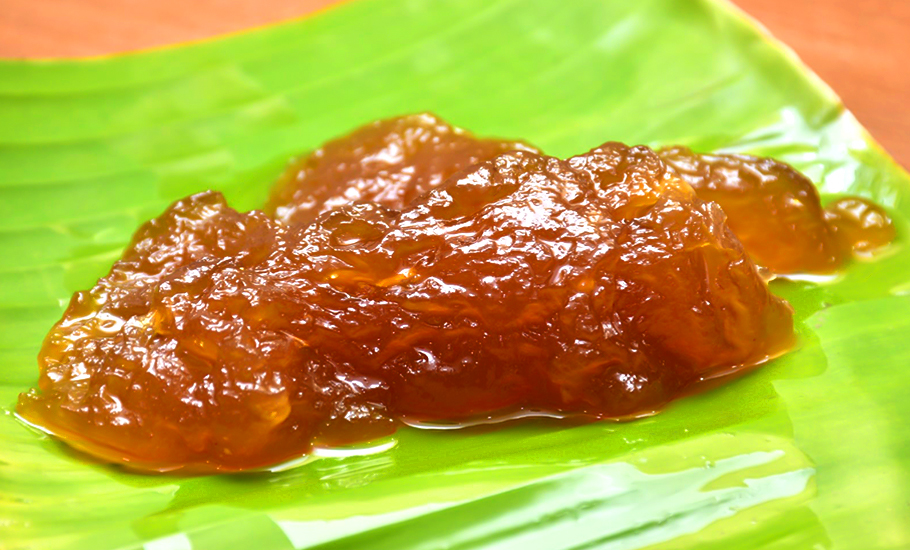
How aroma of Iruttu Kadai halwa unites north and south in Tamil Nadu

Nothing stands between the Dev and devotee at Nellaiappar Temple, standing to the north of Thamirabarani River in Tirunelveli district. Entering through Raja Gopuram (the main temple tower), for centuries people have remained focused on catching a glimpse of the presiding deity Shiva — who going by legends protected the paddy fields (nel: padddy, appar: fatherly protector) and earned his...
Nothing stands between the Dev and devotee at Nellaiappar Temple, standing to the north of Thamirabarani River in Tirunelveli district. Entering through Raja Gopuram (the main temple tower), for centuries people have remained focused on catching a glimpse of the presiding deity Shiva — who going by legends protected the paddy fields (nel: padddy, appar: fatherly protector) and earned his name — to seek new things, express gratitude for what they have, and also on occasions, complain about sufferings, hardships and life’s miseries.
The devotional songs and chants of mantras help devotees remain focused until an aroma begins wafting through the air as the sun prepares to set, almost completely holding the devout captive, setting free the foodie in them.

The aroma resembles the smell of hot ghee but isn’t completely that – there is something more to it. Desperate to unravel the mystery of the aroma, many hurriedly perform the rituals and follow the direction of the fragrance. From Raja Gopuram, they turn right and walk ahead. On the way they find two small shops that claim to be selling ‘original Tirunelveli halwa’. The foodies pause to ensure if they have landed at the source of the aroma only to realise they haven’t. A few more steps and one lands at a nondescript shop sporting a small board, Krishna Singh Sweet Stall ‘Iruttu Kadai’, with a trademark symbol. Standing in a corner of the long alley, the shop doesn’t see sunlight for most part of the day, but it is in the evening when its business begins to shine.
North Indian halwa in south Tamil Nadu
A taste of this Rajput delicacy is said to ensure a gastronomical trip to heaven. What perhaps adds to the lure of the halwa is that it isn’t available round the clock but only begins selling at 5 pm. Long queues begin forming outside the shop even before it opens. Earlier, the shop would declare ‘out of stock’ within a couple of hours but the fourth generation partner Kavitha Singh ensures they do not close the aged wooden shutters, sending patrons empty-handed before 9 pm.
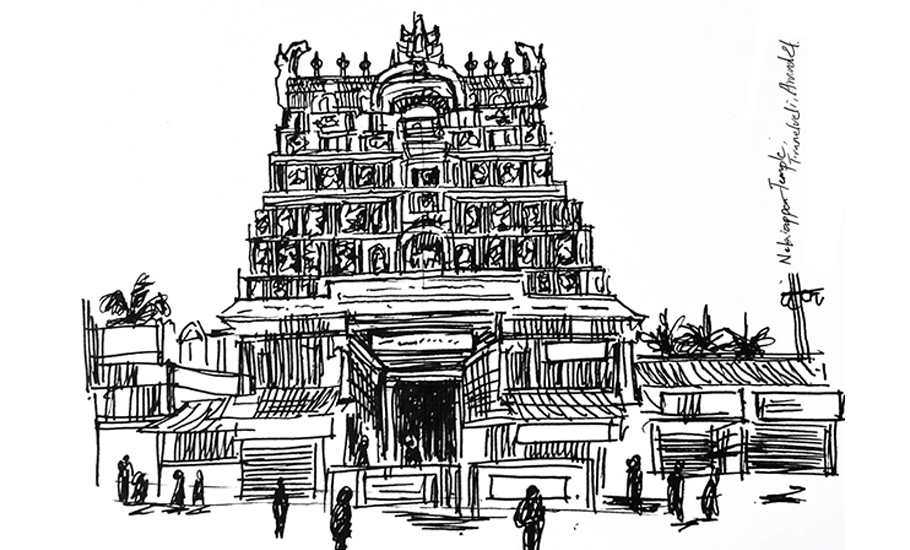
“Don’t mistake the aroma for ghee. It’s a unique mixture of ghee grinded with soaked wheat,” Kavitha Singh, the 4th generation partner running the shop, tells The Federal. Kavitha assures the new generation has brought in technology to scale up production and add to customer experience without compromising on traditions.
“Our founder Krishna Singh would make halwa all through the day and sell it in the evening. The quantity was less. The entire stock would get sold out in an hour. But today we are ensuring the fans of Iruttu Kadai don’t go empty-handed at least till 9 pm,” she adds.
A legacy that is over a century old
The halwa shop was originally founded by Krishna Singh in 1900. Iruttu Kadai halwa, a north Indian delicacy, becoming a modern day cultural identity of Tirunelveli, stands for syncretic tradition of the Indian subcontinent. The shop created its Tirunelveli identity right in front of the Nellaiappar Temple with a history which traces back to BC 1216. The first share of our halwa goes to the living deity of the temple, lord Shiva every day, says Kavitha and goes on to challenge media reports on her family’s history.
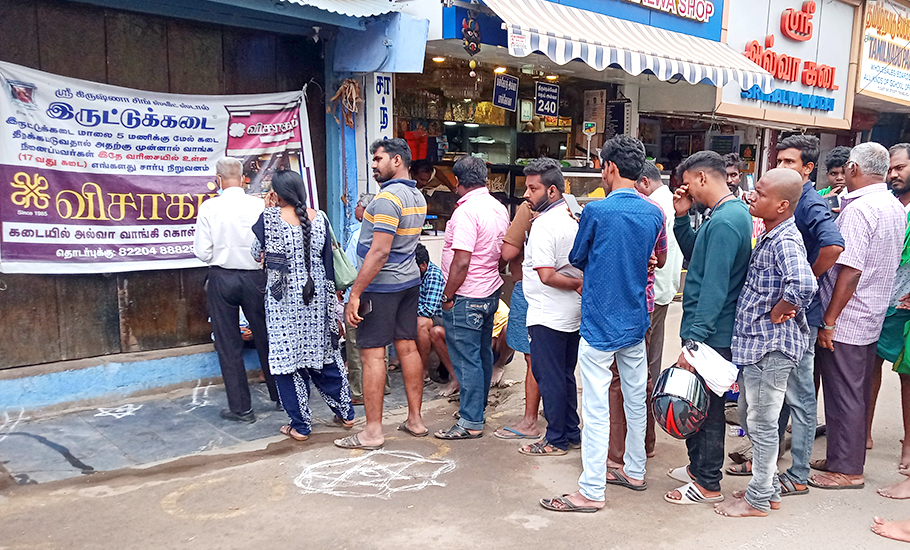
“We weren’t cooks as reported in some media. Instead, we were Rajput warriors. Fate brought us to Tirunelveli as migrants. Sokkampatti Jameen, a king ruling over a small territory, accommodated us by allotting land. We still have landholding in the erstwhile Sokkampatti Jameen. As the predominant occupation changed, our grandfather shifted to cooking Rajput halwa,” she says.
It is common knowledge that Rajput kings didn’t have any Tamil Nadu exploits. It was Maratha kings who touched Madurai and then ruled over Thanjavur, especially the Serfoji II, VV Rajesh, a professor of History with Manonmaniam Sundaranar University, Tirunelveli throws more light on the history.
“Three brands of halwa are closely associated as Tirunelveli halwa — the Lakshmi Vilas Lala Sweets, Santhi Sweets and Iruttukadai. But the third one stood out for its unique branding and the taste it offered when served fresh on a plantain leaf,” he says.
The halwa, stands for the old coexisting with the modern, north with the south. Iruttukadai halwa is still served on plantain leaf, in addition to being sold using advanced packing methods.
The product is the advertisement
The shop owners have rarely relied on advertising the products. The lure for the halwa has grown through word-of-mouth publicity. In fact, the name of the shop, Iruttukadai, was given by the public and not the founder. “Our founder named it ‘Krishna Singh Sweet Stall’. The shop would be dimly lit under a lantern. Since it would be dark, people named the shop Iruttu Kadai [dark shop]. In 2015, we even won a trademark war in the Supreme Court against copycats. Last week too, we filed an FIR against trademark infringement, since copy cats are rampant,” says Kavitha.
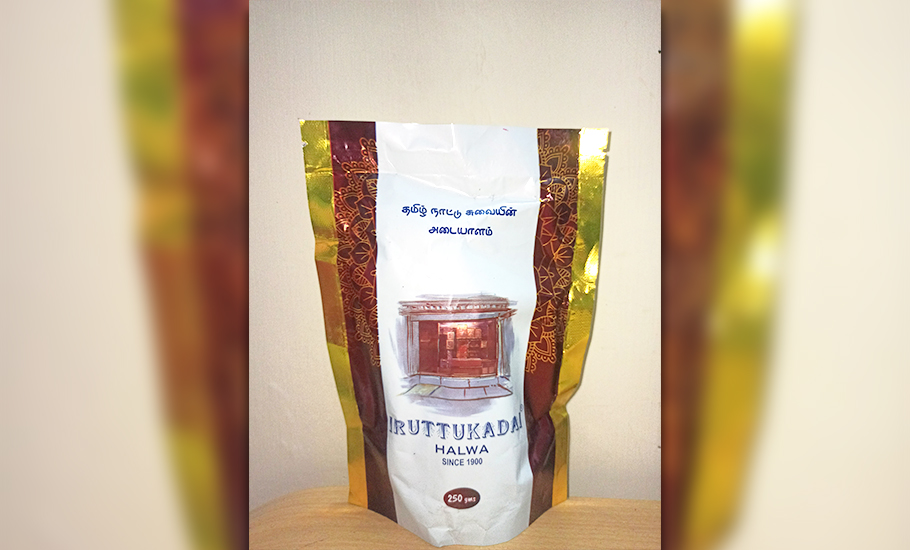
Earlier, the shop used to sell halwa either on a plantain leaf or in plastic packs without brand names. Since that allowed copycats an advantage, the current owners use high end packing and printing of their trademark name.
The makers of the halwa say there are no secret ingredients which make Iruttu Kadai halwa so special, but the traditional process which they say they don’t compromise on. “We take in good quality wheat, soak it well. We use pure Agmark grade cow ghee, unlike many others who may use Dalda, or other cheap oils. We check on fermentation too,” says Kavitha.
But Tirunelveli people like VV Rajesh believe it has something to do with water used in the halwa. Tirunelveli halwa is cooked in the water from the Thamirabrani river which, as per claims, is nourished with the “herbals from the Western Ghats especially the Agasthiyar Hills, the origin of Siddha Medicines’. Rajesh says studies have confirmed that the sand carried by the river contains copper, which could be responsible for the unique taste of this Rajput delicacy.
Noted Tamil writer, Nellai Kannan, who hails from Tirunelveli, once while addressing a public gathering, spoke about the perceived medicinal qualities of the halwa. “If you have an upset stomach, go and have Nei Porrukku (residue of the halwa and wheat from the vessel in which it is made). It will give you a natural cure for your stomach ailments,” he said.
Today the fourth generation is taking the delicacy and product to the next level. They are using modified atmosphere packaging (MAP) which they claim will help halwa last for as long as a year at room temperature since they use pure ghee. “We have put out a disclaimer ‘best to use within one month’ just to follow FIS regulations,” says Kavitha Singh.
Especially so because the customers of the shop could vary from pilgrims going to Sabarimala, a Green Card holder who takes the halwa back to the US, or a common folk of the old town of Tirunelveli.
The fourth generation is ensuring the halwa is available round the clock in their affiliated shop, Visakam Sweets, which is also nearby. A whole lot of mechanization has helped them increase their production to cater to more people and keep the cost at Rs 340 per kilo, despite the use of high-quality ghee which is costly.
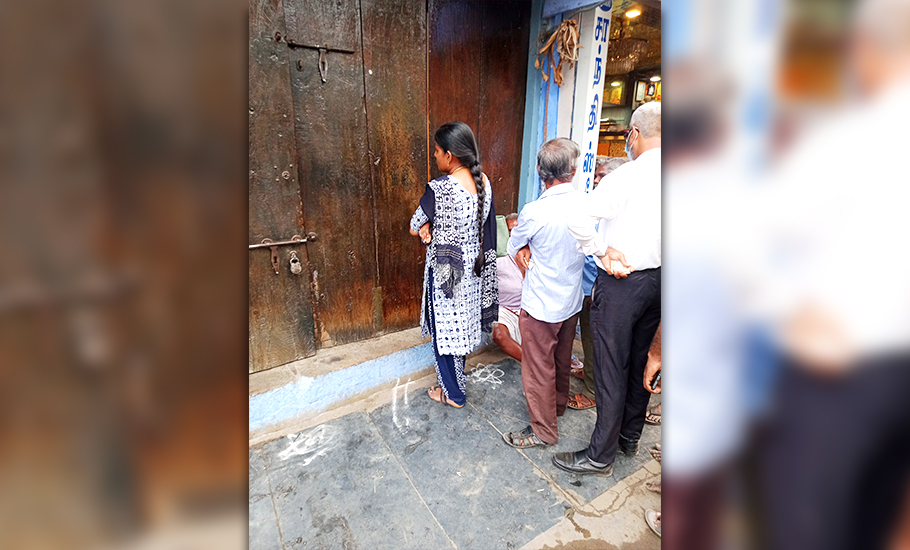
“The founders of Lakshmi Vilas Lala Sweet shop (which claims its origins to 1886) are also related to us. We are happy that we have created halwa as an identity for this town. So, we don’t deal with other halwa sellers as our competitors. Because we cannot fulfill the whole lot of Tiruneveli halwa requirements. Only this trademark infringement is what we take seriously,” says Kavitha speaking to The Federal.
As Kavitha and others running the business with her try to protect the trademark, those in the vicinity of the shop can’t help being drawn to it for a taste of the ‘divine’ delicacy.
